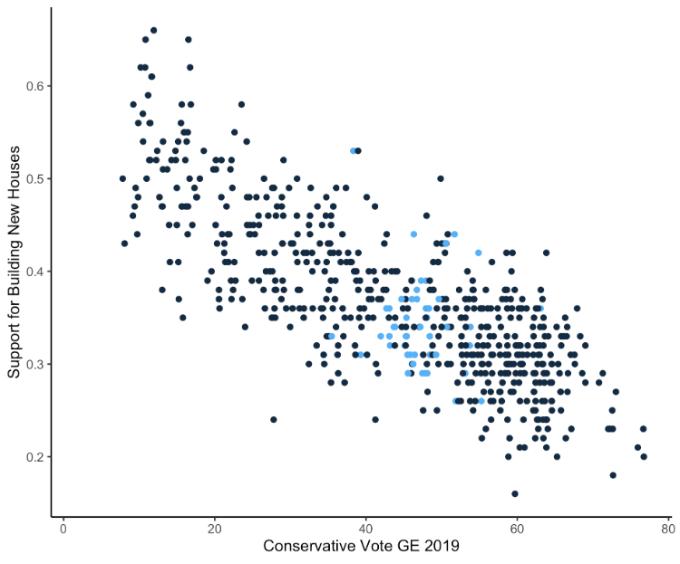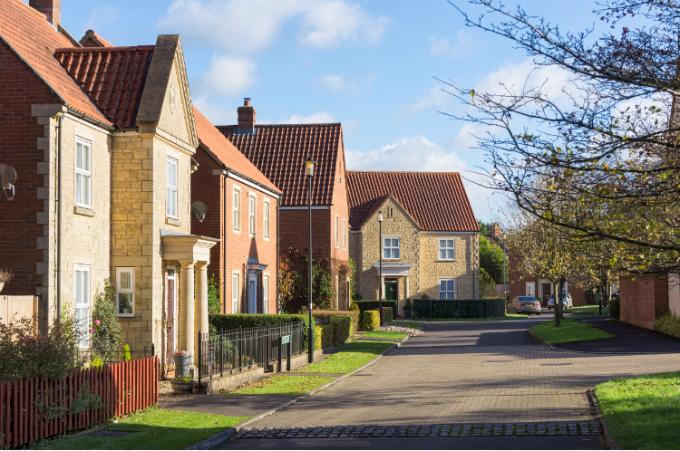Labour's Top Target Seats Are In Major NIMBY Strongholds
7 min read
New data seen by PoliticsHome shows Labour's target seats have a significant number of voters who are vehemently against more housebuilding in their area, leaving the party with a serious balancing act between winning marginal constituencies and keeping promises to solve the housing crisis.
Housebuilding has become a dividing line between the Conservatives and Labour.
While the Conservatives have pledged to build one million more homes, the policy is focussed on urban areas, and is subject to local vetoes and restrictions. Labour leader Keir Starmer has said that if he were elected as prime minister he would instate mandatory housing targets dropped by the Tories, and permit more housebuilding on the Green Belt, adopting the slogan “back the builders, not the blockers”.
Levelling-up Secretary Lisa Nandy has also argued that a future Labour administration would take “difficult decisions” to fix the country’s “broken” housing market. Polling from YouGov found Labour was the most trusted political party to build more houses.
Yet despite the party’s pro-housebuilding rhetoric, a significant number of constituencies Labour intends to target at the next general election in order to secure a parliamentary majority are disproportionately less enthusiastic about more housing in their area.
Ben Ansell, Professor of Comparative Democratic Institutions at the University of Oxford, who conducted research to determine sentiment towards development within individual constituencies, PoliticsHome the Labour Party faces a “double-edged” test when it comes to housebuilding.
Individually, many former Labour voters who switched to the Conservatives at the 2019 general election were relatively pro-housebuilding. However, on a constituency level, the seats which flipped to the Tories in 2019 were disproportionately anti-housebuilding.
“On the one hand, those 2019 Conservative voters who are planning on switching to vote Labour are much more supportive of building new houses than traditional Conservatives,” Ansell told PoliticsHome.
“But in the seats that Labour lost to the Conservatives in 2019, there is relatively low average support for building new houses. Keir Starmer's housing plan is a tricky political balancing act."
Forming a new electoral coalition in seats which are sceptical of development could be a tough test for Starmer. Prominent backbenchers on the Left of the parliamentary party are already flaunting their anti-development credentials.
Rupa Huq, Labour MP for Ealing and Acton, has regularly argued against building new properties and flats in London. Former shadow chancellor John McDonnell, MP for Hayes and Harringdon, has steadfastly defended the Green Belt, having claimed it has been “the fundamental basis of a battle to protect the environment”.
A Labour source told PoliticsHome the party was committed to building more homes and altering the planning system, despite electoral pressures. "We're absolutely committed to building more homes, and to reforming the planning system so that communities are brought into that process earlier," they said.
 Above: The lighter blue dots are constituencies which flipped from Labour to the Conservatives in 2019, and are disproportionately anti-housebuilding (Ben Ansell)
Above: The lighter blue dots are constituencies which flipped from Labour to the Conservatives in 2019, and are disproportionately anti-housebuilding (Ben Ansell)
Housing has risen on the list of the electorate’s priorities in recent years; data from Statista found it was the fifth most important issue for voters.
Head of Political Research at Opinium Adam Drummond told PoliticsHome for Labour to win over target voters, who could have NIMBY tendencies, the party should frame housebuilding as a “national emergency”.
“The proportion who believe the UK doesn't really need to build more homes is quite small and you do get more support for housebuilding, even nearby housebuilding, if you frame it as part of this national emergency,” he explained
“So, there is scope to get more support by framing it as part of an overall renewal strategy for the country that involves building more homes but doing so carefully while also getting the infrastructure to support it up to scratch.”
The evidence is clear that Britain is in the midst of a housing crisis. Research from Centre for Cities, a think tank, stated that Britain has 4.3million homes missing from its housing stock. It has claimed it would take 50 years for the Government to meet the current demand for housing even if it met its advisory housing target of 300,000 homes per year.
Ant Breach, Senior Analyst at Centre for Cities, told PoliticsHome the lack of housing supply in cities such as London, Manchester and Leeds is holding back economic growth – a key mission for a future Labour Government, who have promised to build the fastest growing economy in the G7 if elected.
He claimed whoever leads the next Government faces a “major challenge” over planning reform. Either main party must strike a “new approach” and implement “new legislation” if Britain is to create an environment for enough homes to be built.
“There needs to be an increase in supply, particularly in the most expensive places for housing such as London and the Greater Southeast” Breach told PoliticsHome.
“You can see how the housing crisis features regularly in people’s lives, as they pay higher rents, take longer to get on the housing ladder, and face difficult decisions over where to move and the jobs they can take.”
Tom Wilson, Engagement manager for Priced Out, told PoliticsHome that while some of Labour’s target seats may have vocal “NIMBY minorities”, the fact remains Britain has an “acute housing shortage”.
 (Alamy)
(Alamy)
“Building more homes, through Green Belt and planning reform, presents the only way for Labour to achieve their goal of securing the highest sustained growth in the G7 by 2030, and represents its best chance at winning the election. Keir Starmer is right to say no to the blockers, and deliver his promise to build more homes,” Wilson said.
A major boost to Starmer’s mission to reform planning laws could lie in the rise of the party’s new, young parliamentary candidates. One prospective MP, who has been selected for a winnable southern seat, told PoliticsHome people standing for the party tend to come from so-called 'Generation Rent' – which is stuck in expensive rental accommodation.
David Lawrence, who is the Labour candidate for Basingstoke, told PoliticsHome the UK needs more housing nationally to increase homeownership.
“I think we need more housing nationally, and I think the kind of planning reform that Labour is talking about will probably reduce pressures on places like Basingstoke that have had huge amounts of housing,” he said.
He believed in and around London, it is “surprisingly hard to build because of things like Green Belt restrictions”.
Oliver Ryan, Labour candidate for Burnley, which sits firmly within the Red Wall, said Britain’s existing planning system offers “quite a loud voice” to a “loud minority of people”.
“I think it’s an interesting concept that we should think a bit more strategically in places like Burnley about what we want to achieve long term. Which is, more people that live here, that live happy lives here that contribute to the economy," he explained.
“We absolutely need planning reform…. For Generation Rent, you can’t possibly build up a deposit and go and buy a house, despite it being cheaper for you to buy a house rather than renting, if you spend all your money on rent every month.
“I think there’s probably a few candidates in the same place as I am, which is we know the difficulties of the housing market because we’ve been locked out of it.”
Labour will undoubtedly face tough opposition from its own backbenchers if it attempts to push through planning reform while in Government. Successive Conservative governments have repeatedly tried and failed to overhaul laws and streamline it.
Starmer’s party will hope that with a generation of new MPs, who have been locked out of the housing ladder, will be the key weapon in his arsenal to break the deadlock.
